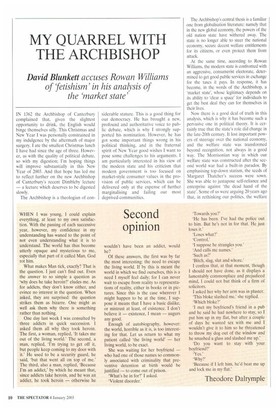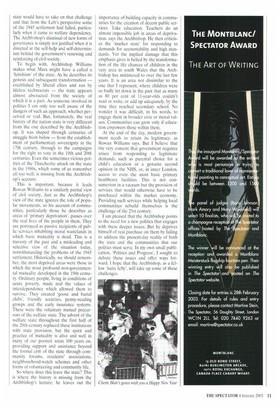MY QUARREL WITH THE ARCHBISHOP
David Blunkett accuses Rowan Williams
of 'fetishism' in his analysis of the 'market state'
IN 1362 the Archbishop of Canterbury complained that, given the slightest opportunity to drink, the English would binge themselves silly. This Christmas and New Year I was personally constrained in my indulgence by the aftermath of major surgery. I ate the smallest Christmas lunch I have had since the age of three. However, as with the quality of political debate, so with my digestion; I'm hoping things will improve substantially in this New Year of 2003. And that hope has led me to reflect further on the new Archbishop of Canterbury's recent Dimbleby lecture — a lecture which deserves to be digested slowly.
The Archbishop is a theologian of con siderahle stature. This is a good thing for our democracy. He has brought a new, profound and authoritative voice to public debate, which is why I strongly supported his nomination. However, he has got some important things wrong in his political thinking, and in the fraternal spirit of New Year good wishes I want to pose some challenges to his arguments. I am particularly interested in his view of the modern state and his criticism that modern government is too focused on market-style consumer values in the provision of public services, which can be delivered only at the expense of further marginalising and failing our most deprived communities. The Archbishop's central thesis is a familiar one from globalisation literature: namely that in the new global economy, the powers of the old nation state have withered away. The state is no longer able to steer the national economy, secure decent welfare entitlements for its citizens, or even protect them from attack.
At the same time, according to Rowan Williams, the modern state is confronted with an aggressive, consumerist electorate, determined to get good public services in exchange for the taxes it pays. In response, it has become, in the words of the Archbishop, a 'market state', whose legitimacy depends on its ability to 'clear a space' for individuals to get the best deal they can for themselves in their lives.
Now there is a good deal of truth in this analysis, which is why it has become such a pervasive one in political theory. It is certainly true that the state's role did change in the late-20th century. It lost important powers of steerage over the national economy, and the welfare state was transformed beyond recognition, not always in a good way. The Morrisonian way in which our welfare state was constructed after the second world war had a built-in paradox. By emphasising top-down statism, the seeds of Margaret Thatcher's success were sown. She was able to juxtapose self-reliance and enterprise against 'the dead hand of the state'. Some of us were arguing 20 years ago that, in rethinking our politics, the welfare state would have to take on that challenge and that from the Left's perspective some of the 1945 settlement had failed, particularly when it came to welfare dependency. The Archbishop's dismissal of new forms of governance is simply not justified when it is directed at the self-help and self-determinism behind the government's renewing and reinforcing of civil society.
To begin with, Archbishop Williams makes what Marx might have a called a 'fetishism' of the state. As he describes its genesis and subsequent transformation — established by liberal elites and run by lifeless technocrats — the state appears almost abstracted from the society of which it is a part. As someone involved in politics I am only too well aware of the dangers of such an approach, whether perceived or real. But, fortunately, the real history of the nation state is very different from the one described by the Archbishop. It was shaped through centuries of struggle from below — from the establishment of parliamentary sovereignty in the 17th century. through to the campaigns for the right to vote in the 19th and 20th centuries. Even the sometimes vicious politics of the Thatcherite attack on the state in the 1980s, which some of us remember all too well, is missing from the Archbishop's account.
This is important, because it leads Rowan Williams to a similarly partial view of civil society. Just as the Archbishop's view of the state ignores the role of popular movements, so his account of communities, particularly those he describes as areas of 'primary deprivation', passes over the real lives of the people in them. They are portrayed as passive recipients of public services inhabiting moral wastelands in which basic mutuality is dead. This is a travesty of the past and a misleading and selective view of the situation today, notwithstanding the problems of the 1945 settlement. Historically, we should remember, the most deprived areas were those in which the most profound non-governmental mutuality developed in the 19th century. Ordinary people, living in conditions of acute poverty, made real the values of interdependence which allowed them to survive. They created 'goose and burial clubs', friendly societies, penny-reading groups and the early insurance systems. These were the voluntary mutual precursors of the welfare state. The advent of the welfare state throughout the first half of the 20th century replaced these institutions with state provision, but the spirit and practice of mutuality is alive and well in many of our poorest areas 100 years on, providing support and assistance beyond the formal arm of the state through community forums, residents' associations, neighbourhood-watch schemes and other forms of volunteering and community life.
So where does this leave the state? This is where the history is missing from the Archbishop's lecture; he leaves out the
importance of building capacity in communities for the creation of decent public services. Take education. Teachers do an almost impossible job in areas of deprivation. says the Archbishop. He then criticises the 'market state' for responding to demands for accountability and high standards. Yet the implied damage that this emphasis gives is belied by the transformation of the life chances of children in the very area in south Wales that the Archbishop has ministered to over the last few years. It is an area not dissimilar to the one that I represent, where children were so badly let down in the past that as many as 80 per cent of 11-year-olds couldn't read or write, or add up adequately, by the time they reached secondary school. No wonder it was difficult, in his words, to engage them in broader civic or moral values. Communities can grow only if education empowers those within them.
At the end of the day, modern government needs to retain its legitimacy. as Rowan Williams says. But I believe that the very consent that government requires arises from responding to legitimate demands, such as parental choice for a child's education or a genuine second opinion in the NHS, or, in inner London, access to even the most basic primary healthcare facilities. This is not consumerism in a vacuum but the provision of services that would otherwise have to be purchased within the market economy. Providing such services while helping local communities rebuild themselves is the challenge of the 21st century.
I am pleased that the Archbishop points to the need for a new politics that engages with these deeper issues. But he deprives himself of real purchase on them by failing to address the present-day reality of both the state and the communities that our politics must serve. In my own small publication, 'Politics and Progress', I sought to debate these issues and offer ways forward. I hope that the Archbishop, as a fellow 'hairy lefty', will take up some of these challenges.



















































 Previous page
Previous page